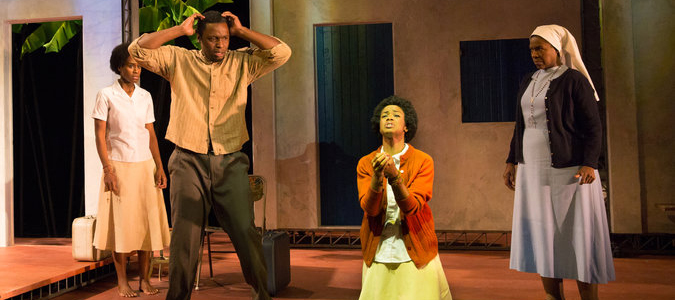

Our Lady of Kibeho
Opening Night: November 16, 2014
Closing: December 7, 2014
Theater: Signature Theatre
Set in 1981, a village girl in Rwanda claims to see the Virgin Mary. Ostracized by her schoolmates and labeled disturbed, everyone refuses to believe, until the impossible starts happening again and again. Skepticism gives way to fear, faith, and fate, causing upheaval in the school community and beyond.
BUY TICKETSREAD THE REVIEWS:
November 16, 2014
In 1981, in the midst of an ongoing civil war in Rwanda between two ethnic groups — the Hutus and Tutsis — a young woman named Alphonsine (Nneka Okafor) begins to make claims of seeing the Virgin Mary and receiving messages from her, the bulk of them urging Alphonsine and everyone else to pray for peace. These apparitions serve as catalysts for confusion, upset, derision, and tests of faith among the people of Kibeho that are masterfully depicted in Katori Hall’s beautiful and enchanting Our Lady of Kibeho. Set predominantly in and within the outskirts of a school, Our Lady of Kibeho begins serenely and melodically with a choir of young women singing the Angelus, a Catholic devotional. Joined together in unity, the gentle ambiance is soon violently interrupted by Sister Evangelique (Starla Benford), a foul-mouthed, ornery woman who is in the throes of an argument with Father Tuyishime (Owiso Odera), the resident priest. They argue over Alphonsine’s allegations, with Sister Evangelique as the staunt opponent.
READ THE REVIEWNovember 16, 2014
Doubting Thomases will have to work extra hard to unpack and explain away the events of Our Lady of Kibeho, a world premiere play by Katori Hall (Hurt Village) at Signature Theatre. The author doesn’t do any of the heavy lifting for you…and that’s a good thing. Hall’s brilliant play, a simultaneously straightforward yet clear-eyed presentation of a recent bit of Catholic mysticism, leaves you grasping for answers and straining for connections days after the final blackout. The play is based on the true story of three Rwandan girls who, in 1982, claimed to see and speak with the Virgin Mary. These “Marian apparitions” have since received Vatican approval. Many view them as a prescient warning about the 1994 Rwandan genocide that resulted in the murder of nearly 1,000,000 people. Scenic designer Rachel Hauck uses the full breadth of the stage to lavishly create the Catholic girls school where the apparitions take place, a cluster of little stucco houses with bright blue doors. They unfold like dollhouses as the scenes require.
READ THE REVIEWNovember 17, 2014
Katori Hall’s fact-based new drama, Our Lady of Kibeho, is an unusual blend of the historical and the devotional, with a forthright, unwinking approach to Roman Catholic theology and beliefs. (This world premiere production runs through Dec. 7 at Off Broadway’s Signature Theatre.) Kibeho centers on three Catholic schoolgirls in rural, pre-massacre Rwanda in 1981: a giggly, somewhat slow-witted Tutsi orphan Alphonsine (Nneka Okafor), a bespectacled Hutu girl Anathalie (Mandi Masden), and older class bully Marie-Clare (Joaquina Kalukango, so remarkable as a Memphis teen at the heart of Hall’s Hurt Village a few seasons ago at this very same theater complex). Like the children at Fatima or Lourdes, this trinity claims to see visions of the Virgin Mary, who has pressing messages both for the church and the Rwandan president. (Their premonitions prove to foreshadow the country’s 1994 genocide, just as the Fatima visions once prophesized World War II.)
READ THE REVIEWNovember 16, 2014
Playwright Katori Hall (The Mountaintop, Hurt Village) came up with an ingenious method for dramatizing a national tragedy in a way that would make it accessible to audiences who might otherwise be overwhelmed by the events. In Our Lady of Kibeho, which was based on real events, the scribe anticipates the 1994 genocide that decimated the population of Rwanda by depicting a 1981 religious miracle that seemed to foretell it. But after pulling off this neat trick, she falls into the trap of the overwritten/underwritten play by dwelling much too long on the miraculous curtain-raiser and avoiding the main event. Legend has it that Rwanda is so lovely, God spends his vacations there. Peter Nigrini conveys that sense of beauty and tranquility by projecting images of a lush green mountain landscape arching over Rachel Hauck’s simple whitewashed set of a Catholic girls’ school. The year is 1981, a time far removed from the civil war that broke out a decade later and the subsequent genocide in which Hutu tribesmen slaughtered upwards of a half-million members of elite Tutsi clans in less than 100 days.
READ THE REVIEWNovember 16, 2014
The teenage girl, a young 17, seems incapable of deception. Her voice rises into a bright squeal when she becomes excited. Her eyes have a limpid clarity that suggests no subterfuge. She is docile and abashed by authority, even though her bubbly nature keeps her long, elegant limbs in constant nervous motion. She doesn’t even wear shoes. And yet the claims of Alphonsine (Nneka Okafor) are outlandish, even in the setting of a Catholic girls school. She says she sees visions of the Virgin Mary, who speaks to her when she is in a trance, filling her spirit with both joy and fear, and telling of events Alphonsine cannot possibly otherwise know. Our Lady of Kibeho, a transfixing new play by Katori Hall that opened on Sunday night at the Signature Theater, explores the turbulent ramifications of Alphonsine’s visions as other girls begin experiencing them, and news of the phenomenon spreads beyond the school into the Rwandan village of the title, in 1981 and 1982. The play has the gripping intensity of a thriller, in part because pricking at the edge of our consciousness throughout is the knowledge of the horror that engulfed the country a little more than a decade after the events in the play take place. Ms. Hall, the author of Hurt Village and Children of Killers, about the survivors of the Rwanda genocide, has an assured sense of dramatic pacing, an ability to evoke a foreign culture with vivid specificity, and an unusual affinity for subject matter that blends history and mystery. (The Mountaintop, her somewhat hokey Broadway play about the Rev. Dr. Martin Luther King Jr., had a supernatural element.) The events depicted in Our Lady of Kibeho actually took place, although Ms. Hall has taken some license to stoke the dramatic fires.
READ THE REVIEW





















